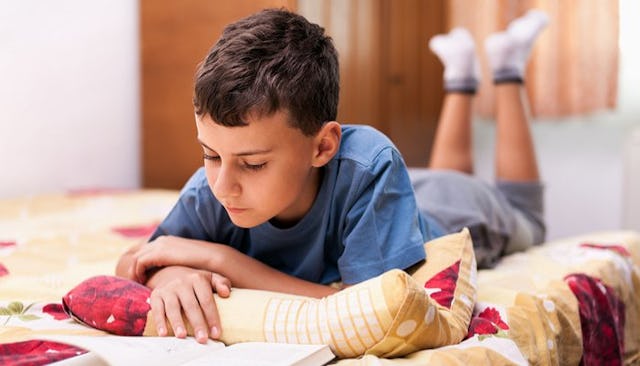Making The Decision To Let A Child Stay Home Alone Is Not Easy

As they say, desperate times call for desperate measures. And the stomach flu is one of those desperate times. My then-8-year-old son had been begging for months to stay home alone, but I wasn’t sure if he was ready. Correction: I wasn’t sure if I was ready. But as he lay on the couch recovering from a bout with the stomach flu, I realized that making him ride in the car while I took my other son to school would be a special kind of agony.
He was vegging out in front of the television and too worn out to engage in any mischief. I would be gone only 15 minutes max. And let’s be honest, I wasn’t too eager to get vomit all over the car either. So I reminded him where to find the emergency numbers on the fridge. I locked all the doors and told him not to open the door for anyone. I took a deep breath and left him — alone.
Everything was fine, and there was no turning back. From that point on, my son asked to be left home alone whenever I was headed out for a quick errand: when I walked the dogs around the block, when I dropped my other son off at a friend’s house, or when I went to the post office. Each time I reminded him of the rules, and each time he proved he’s mature enough to handle the responsibility.
Now that he’s 10 years old and has proven his capability, I barely think twice when I head out the door while he stays home — alone.
The decision to let a child stay home alone is not one that most parents make lightly. Like any big milestone, there’s often a lot of worry, confusion, and discomfort involved. Not to mention the fact that many parents worry less about something going wrong than we do about the judgment of other parents.
And then there are the horror stories about law enforcement or child services getting involved. For instance, last August, a Maryland mom on vacation in Delaware was arrested after leaving her 8- and 9-year-old kids alone in their vacation rental while she ran out to pick up some food. And who can forget the free-range parents who were investigated for letting their 6- and 10-year-old children walk to school alone?
All these stories serve as a kind of worst-case scenario for parents, leaving many of us feeling on edge and worried about judgment at best and a visit from DCFS at worst. Though it’s unlikely to be the first question on a parent’s mind when assessing whether to leave a child home alone, parents are wise to consider the possible legal ramifications. There are no federal laws regarding when a parent can legally leave a child home alone, which means the states decide.
Only a handful of states have a minimum age for kids to be legally left home alone, which ranges from 6 to 14 years old. Where I live, state law says that a parent can be charged with neglect if a child under the age of 14 is left alone for an “unreasonable period of time.” Reasonableness is assessed through 15 factors, including things like the age of the child, the number of children left alone, and the time of day.
I am well aware of these laws, and I still choose to leave my son home alone. Why? Because I am 100% confident that my decision is reasonable. It is perfectly acceptable for me to leave my 10-year-old son home alone, usually playing Xbox, while I run an errand for less than a half hour. If that isn’t reasonable, well, what does that say about the world we live in and the world we are creating for our children?
Not only is leaving a child home alone “reasonable,” it’s also good for the child. In fact, the Child Welfare Information Gateway (which is part of the U.S. Department of Health and Human Services) says, “Being trusted to stay home alone can be a positive experience for a child who is mature and well-prepared. It can boost the child’s confidence and promote independence and responsibility.”
Even though leaving a child home alone is good for the child and the parent, that doesn’t mean all children should be left alone or that there is a one-size-fits-all rule. There are plenty of good and responsible parents who leave their children home alone at a younger age than the state-mandated minimum requirement because their children are mature and ready for the responsibility. Other times a child might not be ready to stay home alone even after they are well into their teens.
Our children’s safety is always of utmost importance. Things like whether the child is physically and mentally able to take care of themselves and whether the child (generally) makes good decisions should be taken into account, as well as whether the child is comfortable being left home alone. Parents should also take certain safety precautions before leaving their child home alone, like leaving emergency phone numbers in an easy-to-see location and showing children how to unlock doors and windows.
There is no map or flowchart for the long and anxiety-laden process of growing up, nor is there a specific protocol when it comes to issues of trust and responsibility. It’s a personal decision and oftentimes a decision that comes from the gut as much as from the head.
Deciding whether and when a child is ready to be left home alone is never easy — at least not at first. But it does get easier, especially when the worries are outweighed by the sweet freedom of running to the grocery store for a gallon of milk and a case of wine without the constant pleas for Doritos and baseball cards.
This article was originally published on